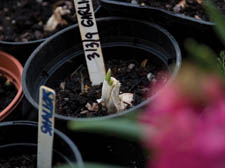|
|
 |
| |
Don’t potter – there’s still plenty of work to do before winter sets in
Tom Moggach offers some timely tips for protecting delicate plants from extreme chills and getting a head start on next year’s crops
WHY fool ourselves?
It’s turned nippy, and Oxford Street has gone bonkers for Christmas. Winter is on its way, plant growth is sluggish and it’s tempting to hibernate on the sofa.
But don’t hang up your trowel just yet. There are still plenty of useful gardening jobs to finish off – here are some top tips for November.
Protect vulnerable plants
FROSTS are rare in London. Nevertheless, get ready to spring into action if the temperature drops sharply.
Protect your winter salad crops with a layer of fleece. Move pots indoors – I have mint and basil on my window sill to keep them going.
Wrap up pots of tender perennials with cloth or sacking to stop the roots from freezing.
Feed the birds
BUY squirrel-proof feeders if possible, as these creatures are annoyingly crafty.
Keep feeding the birds through winter, and don’t forget a shallow bowl of drinking water.
Plant garlic
GO for unusual varieties such as Chesnok Wight or Elephant Garlic, a closer relative to the leek. Garlic does well in pots or the ground.
Push individual cloves into soil or compost, pointy tip up, around an inch deep. Or sow in large module trays and plant out in spring.
For a wide selection, try The Garlic Farm (thegarlicfarm.co.uk). Shallots are another good bet.
Make leaf mould
IF you’ve got a garden or allotment, gather up
fallen leaves for leaf mould. Stab small holes in a bin liner, fill up with leaves, add a splash of water and leave for a year or so.
Then use as a mulch, or, when nice and crumbly, as a terrific soil conditioner or ingredient for home-made seed and potting composts.
Avoid leaves from evergreens and conifers for growing vegetables.
Grow rhubarb
RHUBARB is a magic ingredient in the kitchen, so it makes sense to grow your own.
It’s a large plant, so you need a garden or
allotment. Moreover, it’s best to wait a year before your first harvest. Buy ‘crowns’, the one-year old plant, not rhubarb seed. Mulch existing plants with well-rotted manure.
Get a head start on broad beans
TRY for an early crop – broad beans relish cooler temperatures.
Choose a sunny and sheltered spot outdoors, digging in manure or leaf mould beforehand.
Or sow in three inch pots filled with multi-purpose compost, leave to germinate in a cool spot then harden off before planting out.
Insulate your compost bin or wormery
COLD weather slows the composting process.
To reinvigorate your heap, turn it over to add oxygen.
Line plastic compost bins with bubble wrap and cardboard – you can check the video tutorial on cityleaf.co.uk for further tips and tricks.
Remember, if you use a wormery, cover in winter to keep the worms warm.
• In my next column, in a fortnight, I’ll be dealing with soft fruit. So, watch this space!
|
 |
|
|
 |

|
|
 |
|









